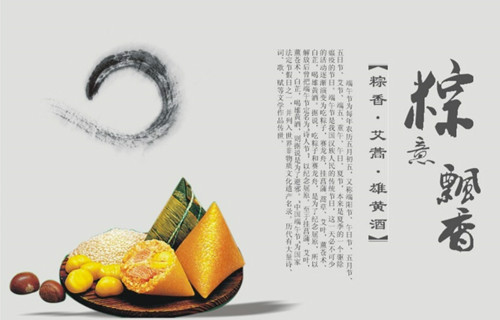导读:一年一度的端午佳节又要来临了,关于该节日的由来也是众说纷纭,今天小编特意科普三个流传较广的传说版本,大家来一探究竟吧。

The Dragon Boat Festival is a traditional Chinese festival. It has a history of more than 2,000 years, and is believed to have originated during the Warring States period.
作为中国的传统节日之一,端午节据传起源于战国时期,至今已有长达两千多年的历史。
There are a number of origin stories related to the Dragon Boat Festival, among which the following 3 legends are the most widely circulated.
历史上就端午节的起源而言有很多相关的故事,下面小编选取三个流传最广泛的传说,介绍给大家。
Qu Yuan (340–278 BC) was a patriotic poet and a loyal official of the state of Chu during the Warring States Period.
故事1:纪念屈原
Qu Yuan (340–278 BC) was a patriotic poet and a loyal official of the state of Chu during the Warring States Period.
屈原(公元前340-278)是战国时期楚国的一位朝廷官员,同时也是一位爱国诗人。
Qu Yuan was born in a ruling family and served in high offices. He was the number one advisor of the Kingdom of Chu, and dedicated his whole life to assisting the king to build the State of Chu stronger.
屈原生于当时的统治家族,在朝堂身居要职,作为楚国大夫为当政者出谋献策,并为辅佐振兴该王朝付出了自己的一生。
He advised the King to ally with the State of Qi to fight against the most powerful State of Qin. However, he was slandered by jealous officials and accused of treason, and the King dismissed and exiled him.
当时,屈原建议楚王联合齐国共同抵抗当时力量强大的秦国。然而,早就因嫉妒而对其怀恨在心的官员诽谤屈原并指控其犯有叛国罪,随后屈原便遭楚王免职,并惨遭流放。
During his exile, Qu Yuan wrote a great deal of enduring poems showing his love and passion for his country, some of which are still very famous in China.
在被流放期间,屈原写下了许多流传千古的诗句,以示自己对国家的满腔热爱,有些诗句至今都非常有名。
In 278 BC, the Qin State conquered the capital of Chu. On hearing of the defeat, Qu Yuan in great despair committed suicide by drowning himself in the Miluo River on the 5th day of the 5th lunar month.
公元前278年,秦国攻破楚国都城。听到此消息之后,屈原便在五月初五这一日怀着深深的怨念跳入汨罗江自尽。
When they heard of Qu Yuan’s death, the local people were very sad, and rowed out on the river to search for his body, but were unable to find him. To preserve his body, the locals paddled their boats up and down the river, hitting the water with their paddles and beating drums to scare evil spirits away. They threw lumps of rice into the river to feed the fish, so that they would not eat Qu Yuan’s body.
当听闻屈原的死讯之后,当地人民感到非常悲伤,纷纷划船到江中寻找他的尸体,但最终也未能找到。为了保护屈原的躯体,当地人民争先将船桨在江中上下摆动,同时敲锣打鼓以吓退邪灵。后来,居民们还向水中投放米团喂鱼,防止鱼群破坏屈原的尸体。
Since then, people in the Miluo River area have followed similar practices to commemorate Qu Yuan on the fifth day of the fifth lunar month. Gradually, rowing boats developed intodragon boat racing, the lumps of rice became sticky rice dumplings (zongzi) traditionally eaten during the festival.
自此之后,每逢五月初五这天,汨罗江周围的百姓们就通过上述方式来纪念屈原。划船逐渐演变成为赛龙舟这一竞技运动,喂鱼的米团也演变成端午节这一天特有的专属食物——粽子。
Story 2: Commemorating Wu Zixu
故事2:纪念伍子胥
In Jiangsu and Zhejiang, the legend of Wu Zixu is very popular. Wu Zixu (559–484 BC) was also from the State of Chu, before the time of Qu Yuan. His father was a loyal tutor of the Chu ruler’s family, but was imprisoned by the king of Chu. The king also ordered the execution of Wu Zixu and his older brother Wu Shang. He was forced to flee to the State of Wu after his father and brother were killed.
在江浙一带,伍子胥的传说更加流行一些。伍子胥(公元前559-484)同样为楚国人,时间上则早于屈原。伍子胥的父亲本是辅佐皇室的太傅,但后来被楚王囚禁。事实上楚王也曾下令处死伍子胥极其兄长伍尚,在其父兄双双并被处死之后,伍子胥也随之被迫出逃。
Wu Zixu assisted the king of Wu in conquering the Chu State and avenged the deaths of his father and brother. After that, Wu Zixu rose quickly in prominence. However, after the king died, his son Fuchai took the throne. Concerned with the safety of the kingdom, Wu Zixu advised the king to conquer the State of Yue, but Wu Zixu did not gain the new king’s trust, and was ignored, instead listening to an official who was bribed by the state of Yue.
后来,伍子胥辅佐吴国攻破楚国,为其父兄报仇雪恨,在吴国的地位也逐渐举足轻重起来。然而,吴王阖闾后来去世,其子夫差继承王位。考虑到吴国安危,伍子胥建议夫差攻打越国,但夫差并不信任伍子胥,反而听信另一位与越国暗中勾结的大臣之言。
The king forced Wu Zixu to commit suicide on the fifth day of the fifth lunar month. Before he committed suicide, Wu Zixu asked the king to remove his eyes and hang them on the top of the city gate, so he could see the capture of Wu by Yue troops.
夫差在五月初五这一天强制赐死伍子胥。在死之前,伍子胥要求将自己的眼睛挖出来并挂在城门之上,亲眼看着越国军队灭掉吴国。
The king knew was very angry and ordered Wu Zixu’s body be thrown into a river near Suzhou. The locals who sympathized with him held dragon boat racing and other activities in memory of him, and this is also cited as the origin of the Dragon Boat Festival.
夫差听闻之后非常生气,下令将伍子胥的尸体丢入苏州附近的一条河中。当地百姓哀怜他,通过赛龙舟以及其他方式来纪念他,这也是端午节由来的另一种说法。
Story 3: Commemorating the Filial Piety of Cao E
故事3:纪念孝女曹娥
Another popular legend about the Dragon Boat Festival is in memory of a young girl, Cao E who died trying to retrieve her father’s body from a river.
此外,端午节还有另外一个版本的传说,即纪念一位为找回自己父亲尸体而投江自尽的女子——曹娥。
When her father drowned in a river, and his body was unable to be found for days, Cao E walked along the river bank day-and-night looking for her father’s body, crying her heart out.
曹娥的父亲在河中溺死之后,尸体却消失不见,曹娥沿着河边昼夜搜寻号哭。
On the fifth day of the fifth lunar month, she jumped into the river too, and five days later her body was found with her father in her arms.
后来,曹娥便在五月初五这一天投河自尽,五日之后抱出父尸。
In order to commemorate Cao E and her sacrifice of filial piety, a temple was built in the year of 151, and the river she drowned in was renamed the Cao’e River.
为了纪念孝女曹娥,当地居民于公元151年专门为其建立寺庙,其殉父之处也改名为“曹娥江”。
Although the legendary origins of the Dragon Boat Festival vary regionally, they all involve some of the most important traditions in Chinese culture like virtue, spirit, loyalty, honor, and love. They have been, and will probably always be, told from one generation to the next.
尽管关于端午节的由来在各地区都有所不同,但基本上所有的故事都包含了诸如美德、鬼神、忠诚、信用以及仁爱等中国文化中最重要的经典元素。相信这些传说会一代一代永远流传下去。